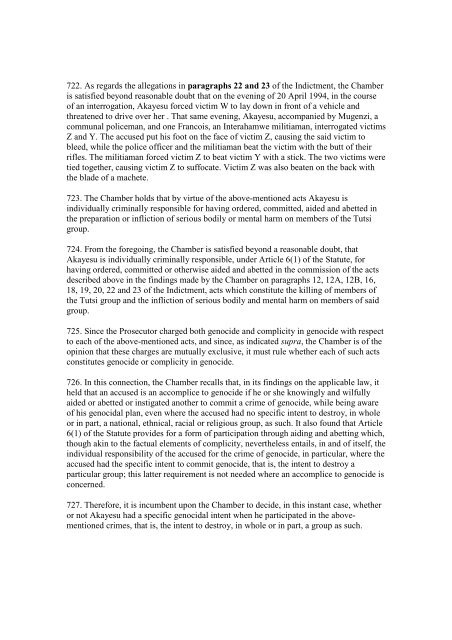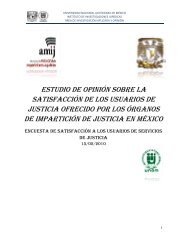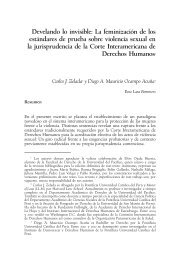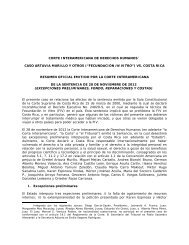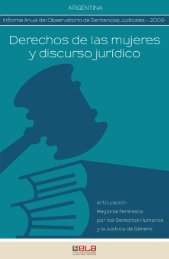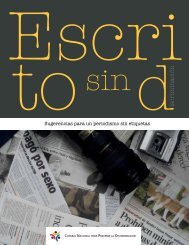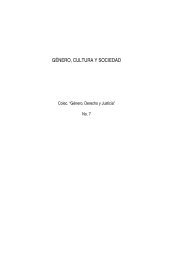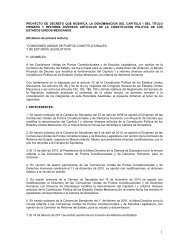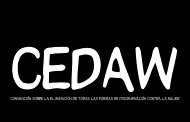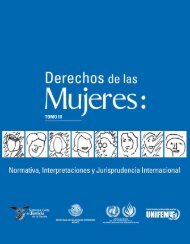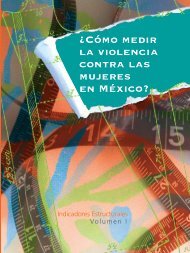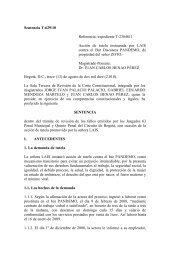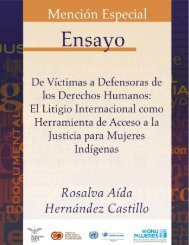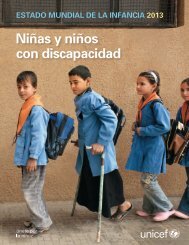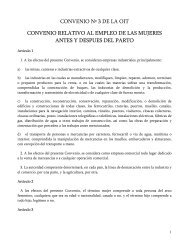execution of the killings of members of the Tutsi group and the infliction of seriousbodily and mental harm on members of said group.716. Regarding the allegations in paragraph 19, the Chamber is satisfied that it has beenestablished that on or about 19 April 1994, Akayesu took from Taba communal prisoneight refugees from Runda commune, handed them over to Interahamwe militiamen andordered that they be killed. They were killed by the Interahamwe using various traditionalweapons, including machetes and small axes, in front of the Bureau communal and in thepresence of Akayesu who told the killers "do it quickly". The refugees were killedbecause they were Tutsi.717. The Chamber holds that by virtue of such acts, Akayesu incurs individual criminalliability <strong>for</strong> having ordered, aided and abetted in the perpetration of the killings ofmembers of the Tutsi group and in the infliction of serious bodily and mental harm onmembers of said group.718. The Prosecutor has proved that, as alleged in paragraph 20 of the Indictment, onthat same day, Akayesu ordered the local people to kill intellectuals and to look <strong>for</strong> oneSamuel, a professor who was then brought to the Bureau communal and killed with amachete blow to the neck. Teachers in Taba commune were killed later, on Akayesu'sinstructions. The victims included the following: Tharcisse Twizeyumuremye, Theogene,Phoebe Uwineze and her fiancé whose name is unknown. They were killed on the road infront of the Bureau communal by the local people and the Interahamwe with machetesand agricultural tools. Akayesu personally witnessed the killing of Tharcisse.719. In the opinion of the Chamber, Akayesu is indeed individually criminallyresponsible by virtue of such acts <strong>for</strong> having ordered, aided and abetted in the preparationor execution of the killings of members of the Tutsi group and in the infliction of seriousbodily and mental harm on members of said group.720. The Chamber finds that the acts alleged in paragraph 21 have been proven. It hasbeen established that on the evening of 20 April 1994, Akayesu, and two Interahamwemilitiamen and a communal policeman, one Mugenzi, who was armed at the time of theevents in question, went to the house of Victim Y, a 69 year old Hutu woman, tointerrogate her on the whereabouts of Alexia , the wife of Professor Ntereye. During thequestioning which took place in the presence of Akayesu, the victim was hit and beatenseveral times. In particular, she was hit with the barrel of a rifle on the head by thecommunal policeman. She was <strong>for</strong>cibly taken away and ordered by Akayesu to lie on theground. Akayesu himself beat her on her back with a stick. Later on, he had her lie downin front of a vehicle and threatened to drive over her if she failed to give the in<strong>for</strong>mationhe sought.721. Although the above acts constitute serious bodily and mental harm inflicted on thevictim, the Chamber notes that they were committed against a Hutu woman.Consequently, they cannot constitute acts of genocide against the Tutsi group.
722. As regards the allegations in paragraphs 22 and 23 of the Indictment, the Chamberis satisfied beyond reasonable doubt that on the evening of 20 April 1994, in the courseof an interrogation, Akayesu <strong>for</strong>ced victim W to lay down in front of a vehicle andthreatened to drive over her . That same evening, Akayesu, accompanied by Mugenzi, acommunal policeman, and one Francois, an Interahamwe militiaman, interrogated victimsZ and Y. The accused put his foot on the face of victim Z, causing the said victim tobleed, while the police officer and the militiaman beat the victim with the butt of theirrifles. The militiaman <strong>for</strong>ced victim Z to beat victim Y with a stick. The two victims weretied together, causing victim Z to suffocate. Victim Z was also beaten on the back withthe blade of a machete.723. The Chamber holds that by virtue of the above-mentioned acts Akayesu isindividually criminally responsible <strong>for</strong> having ordered, committed, aided and abetted inthe preparation or infliction of serious bodily or mental harm on members of the Tutsigroup.724. From the <strong>for</strong>egoing, the Chamber is satisfied beyond a reasonable doubt, thatAkayesu is individually criminally responsible, under Article 6(1) of the Statute, <strong>for</strong>having ordered, committed or otherwise aided and abetted in the commission of the actsdescribed above in the findings made by the Chamber on paragraphs 12, 12A, 12B, 16,18, 19, 20, 22 and 23 of the Indictment, acts which constitute the killing of members ofthe Tutsi group and the infliction of serious bodily and mental harm on members of saidgroup.725. Since the Prosecutor charged both genocide and complicity in genocide with respectto each of the above-mentioned acts, and since, as indicated supra, the Chamber is of theopinion that these charges are mutually exclusive, it must rule whether each of such actsconstitutes genocide or complicity in genocide.726. In this connection, the Chamber recalls that, in its findings on the applicable law, itheld that an accused is an accomplice to genocide if he or she knowingly and wilfullyaided or abetted or instigated another to commit a crime of genocide, while being awareof his genocidal plan, even where the accused had no specific intent to destroy, in wholeor in part, a national, ethnical, racial or religious group, as such. It also found that Article6(1) of the Statute provides <strong>for</strong> a <strong>for</strong>m of participation through aiding and abetting which,though akin to the factual elements of complicity, nevertheless entails, in and of itself, theindividual responsibility of the accused <strong>for</strong> the crime of genocide, in particular, where theaccused had the specific intent to commit genocide, that is, the intent to destroy aparticular group; this latter requirement is not needed where an accomplice to genocide isconcerned.727. There<strong>for</strong>e, it is incumbent upon the Chamber to decide, in this instant case, whetheror not Akayesu had a specific genocidal intent when he participated in the abovementionedcrimes, that is, the intent to destroy, in whole or in part, a group as such.
- Page 2 and 3:
1.2. The Indictment1.3. Jurisdictio
- Page 4 and 5:
eports2 which indicated that acts o
- Page 6 and 7:
3. Jean Paul AKAYESU, born in 1953
- Page 8 and 9:
16. Jean Paul AKAYESU, on or about
- Page 10 and 11:
Counts 7-8(Crimes Against Humanity)
- Page 12 and 13:
c) Deliberately inflicting on the g
- Page 14 and 15:
1.4. The Trial1.4.1. Procedural Bac
- Page 16 and 17:
y the opening statement for the Def
- Page 18 and 19:
y the Tribunal for crimes related t
- Page 20 and 21:
38. Regarding the Gishyeshye meetin
- Page 22 and 23:
witness was lying because he or she
- Page 24 and 25:
in the commune. His de facto author
- Page 26 and 27:
70. Apart from asking the prefect t
- Page 28 and 29:
84. According to the testimony of D
- Page 30:
Scores of political leaders were im
- Page 33 and 34:
his listeners to avoid the error of
- Page 35 and 36:
111. The killing of Tutsi which hen
- Page 37 and 38:
killed on the grounds that the foet
- Page 39 and 40:
128. In conclusion, it should be st
- Page 41 and 42:
Witness statements137. During the t
- Page 43 and 44:
protection of witnesses issued by t
- Page 45 and 46:
covered anyone who had anti-Tutsi t
- Page 47 and 48:
Tutsi and the Tutsi were accused of
- Page 49 and 50:
as "two armies", "two belligerents"
- Page 51 and 52:
"The primary criterion for [definin
- Page 53 and 54:
180. Many witnesses testified regar
- Page 55 and 56:
stated in that Decision, it did not
- Page 57 and 58:
deeds. For these reasons, the Chamb
- Page 59 and 60:
Concerning the allegation that at l
- Page 61 and 62:
turned over alive to Akayesu, and t
- Page 63 and 64:
younger brothers. He stated that he
- Page 65 and 66:
237. Karangwa testified under cross
- Page 67 and 68:
three brothers lie on their stomach
- Page 69 and 70:
known as Usuri (phonetic spelling)
- Page 71 and 72:
Karangwa's explanation for the inco
- Page 73 and 74:
Count 3, Crimes against Humanity (e
- Page 75 and 76:
those killed were professors from R
- Page 77 and 78:
290. Witness DCC for the Defence, d
- Page 79 and 80:
children, and old people. The Chamb
- Page 81 and 82:
further that he had not heard of Ak
- Page 83 and 84:
to fetch the one who remains', a pr
- Page 85 and 86:
sector councillors called on the cr
- Page 87 and 88:
According to witness A, the bourgme
- Page 89 and 90:
present took it to mean that the Tu
- Page 91 and 92:
355. The Accused himself confirmed
- Page 93 and 94:
364. Paragraph 15 of the Indictment
- Page 95 and 96:
The witness said a certain Françoi
- Page 97 and 98:
has not been proved beyond reasonab
- Page 99 and 100:
who had come to his house. He said
- Page 101 and 102:
Interahamwe at the entrance, carryi
- Page 103 and 104:
ack to the bureau communal and on t
- Page 105 and 106:
Victim Y (Witness N), a [68] year o
- Page 107 and 108:
which were at times committed by mo
- Page 109 and 110:
communal into a forest in the area
- Page 111 and 112:
clubbing a young teacher who had be
- Page 113 and 114:
434. Two days after arriving at the
- Page 115 and 116:
he went into hiding during the mass
- Page 117 and 118:
ureau communal, but he insisted tha
- Page 119 and 120:
taken away from the bureau communal
- Page 121 and 122:
The Accused himself testified that
- Page 123 and 124: 464. In that case, when the matter
- Page 125 and 126: "A person who planned, instigated,
- Page 127 and 128: involve facilitating the commission
- Page 129 and 130: 493. In accordance with the said pr
- Page 131 and 132: Deliberately inflicting on the grou
- Page 133 and 134: y a psychological relationship betw
- Page 135 and 136: Chamber notes that, as stated above
- Page 137 and 138: • complicity by procuring means,
- Page 139 and 140: 547. Consequently, where a person i
- Page 141 and 142: underscoring their commitment to se
- Page 143 and 144: character134. In fact, the concept
- Page 145 and 146: 575. The definition of crimes again
- Page 147 and 148: grounds mentioned in Article 3 of t
- Page 149 and 150: accepted definition of this term in
- Page 151 and 152: adopted primarily to protect the vi
- Page 153 and 154: 610. Whilst the Chamber is very muc
- Page 155 and 156: description, namely, what constitut
- Page 157 and 158: forces to plan and carry out concer
- Page 159 and 160: 635. There is no clear provision on
- Page 161 and 162: 7.2. Count 5 - Crimes against human
- Page 163 and 164: 663. The definition of crimes again
- Page 165 and 166: 677. The Tribunal notes that eviden
- Page 167 and 168: 685. In the light of its factual fi
- Page 169 and 170: 692. The Tribunal finds, under Arti
- Page 171 and 172: determine, as far as each proven fa
- Page 173: the Tutsi in general. Akayesu who h
- Page 177 and 178: 732. The rape of Tutsi women was sy
- Page 179 and 180: Chamber finds beyond a reasonable d
- Page 181 and 182: Footnote 11. Decision: Order for Co
- Page 183 and 184: Footnote 41. Article 104 of the Loi
- Page 185 and 186: Footnote 68. Dictionnaire Rwandais-
- Page 187 and 188: Footnote 103. "Principles of Intern
- Page 189 and 190: Footnote 134. Secretary General's R
- Page 191: Footnote 171. See General Legal Fin


